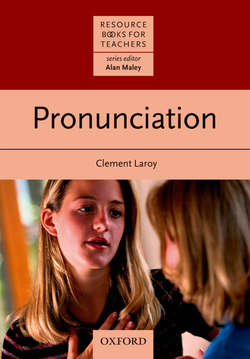Читать книгу Pronunciation - Clement Laroy - Страница 6
На сайте Литреса книга снята с продажи.
Introduction
Оглавление‘The road is difficult, not because of the deep river and the high mountains that bar the way, but because we lose heart when we think of the river and the mountain.’
Vietnamese saying
When I was a young, inexperienced teacher, I was convinced that English pronunciation was exceptionally difficult, especially for speakers of some languages. But I believed that all the problems could be solved by phonetics. So I decided to take the bull by the horns.
I used to begin courses by teaching the names of the speech organs and the difference between vowels and consonants. My learners also practised reading and writing texts written in phonemic script.
As a consequence my classes ‘knew all about’ the uvula and lip rounding; they practised minimal pairs, prominence, and intonation nuclei and contours; they had a lot of dictations and repeated a lot; and yet, what I viewed as the formula for teaching English pronunciation did not yield the results I and my learners had hoped for, in spite of all our hard work.
I kept faith and hope, followed new trends, disguised drills as games to make them more palatable, was seduced by communicative approaches – and never let go. And yet, with many learners the results were still disappointing.
I gradually realized that phonetics and drills often led learners to hate or fear the study of English and inhibited their speaking. With many learners it was hard to see the link between class practice and progress. I would also come across people from language backgrounds which have a reputation for finding the pronunciation of English particularly arduous who had overcome the obstacles.
All this suggested to me that it is not simply the intrinsic difficulty of English that causes many students to stumble and struggle with pronunciation. I thought it might be useful to try to understand what the obstacles are, how pronunciation is learned, and what conditions help learners internalize it.
Having lost my youthful certainties, I gradually came to a number of conclusions. These did not constitute the ingredients of a new ‘magical formula’, but they did engender activities which turned out to be fun while giving learners insights and helping them.
Here, then, are some of the results of my observations.
Historical obstacles
Our affective links with our mother tongue are normally positive and strong, but when we learn a foreign language we have a history and prejudices to contend with, and the older we get, the more intrusive this history is likely to become. Think of all the countries and peoples who have had contact with people speaking various brands of English during wars, or who were once part of the British Empire. Others may resent what they see as the inroads English (in any of its varieties) has made as a world lingua franca. Such negative feelings can produce a strong desire to set oneself apart from the language and its native speakers. After all, even within the English-speaking world people keep themselves apart regionally and socially through the way they pronounce the language.
Personal and sociological obstacles
A person will only want to achieve something if they believe it is achievable and worth attaining because of the social, intellectual, or aesthetic benefits it will bring. Many factors may interfere with learners’ setting and attaining their goals.
First, learners’ relationships with the smaller or wider community around them have a strong influence on their desire or unwillingness to learn a foreign language well. Here are some examples.
– Adolescents, for example, may actively try not to be good in order to integrate better with their peers, and may wish to set themselves off from their teachers who would like them to take on a standard British English pronunciation. They themselves may feel more attracted by the English spoken by members of their favourite pop group or by Americans, Australians, or Indians.
